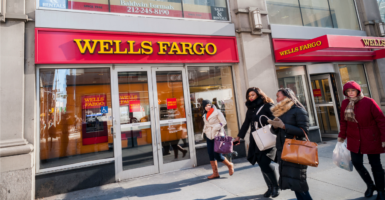On Tuesday, Sept. 13, the House Financial Services Committee passed the Financial CHOICE Act. Among other needed financial reforms, the bill would make taxpayer-funded bailouts of big banks less likely and ease regulations that hurt community banks.
It’s hardly a surprise that the vote (30–26) was largely along party lines, but some of the anti-CHOICE Act rhetoric was disturbing. Just as with the 2010 Dodd-Frank Act, it appears that fear-mongering and special interest lobbying will prevent real financial reforms from even being debated.
Only one of the bill’s 11 sections deals with reform of the Consumer Financial Protection Bureau (CFPB), but opponents are doing their best to tie this entire debate to the CFPB and Wells Fargo. In the process, they’re presenting Americans with a false choice: leave the CFPB alone and remain safe, or reform the CFPB and drown in fraud.
Ranking member Maxine Waters, D-Calif., proclaimed:
We need to look no further than just last week to see why we need a strong Consumer Financial Protection Bureau, which used its authorities under Dodd-Frank to uncover a massive scheme under which millions of consumer accounts at Wells Fargo were fraudulently opened, with the bulk of this fraud perpetrated in my hometown of Los Angeles.
One serious problem with this logic is that the fraud occurred just prior to 2014, almost two years after the CFPB was up and running. And the CFPB didn’t uncover it.
If the CFPB is so vital for fraud protection, what happened?
But what good is logic when the objective is to scare everyone into believing Dodd-Frank and the CFPB make us safer? Fear-mongering is a tried and true Washington tactic, especially when it comes to financial markets.
And it’s not just politicians who use fear-mongering. Special interest groups use the same ploy, and the retail trade associations’ opposition to the CHOICE Act’s repealing of the so-called Durbin Amendment is the perfect example.
The Durbin Amendment, named after Illinois Senator Dick Durbin, imposed a price cap on the debit card interchange (“swipe”) fees that banks charge for using their cards. Supposedly, retailers everywhere were going to pass these savings on to their consumers.
As was easily predicted, consumers haven’t saved at all. Even Barney Frank admits that consumers didn’t see any benefit from the price cap.
Instead, retailers have benefited from the lower fees without lowering their customers’ prices. Worse, consumers have lost out on low-cost banking services because banks raised other fees to compensate for their lost revenue.
Need more evidence?
It’s not the consumers clamoring for the House to leave price controls in place. It is business and retail trade associations, such as the National Grocers Association, the Society of Independent Gasoline Marketers of America, and the National Restaurant Association.
There’s no doubt that these groups’ members have a difficult time running a profitable business, but so does everyone. Instead of pushing back on the CHOICE Act over one tiny section—one that would benefit millions of consumers—these groups should push for large-scale relief of the regulations that make it so difficult for their members to earn money.
Supporting the types of reforms in the CHOICE Act would be a great place to start.





























